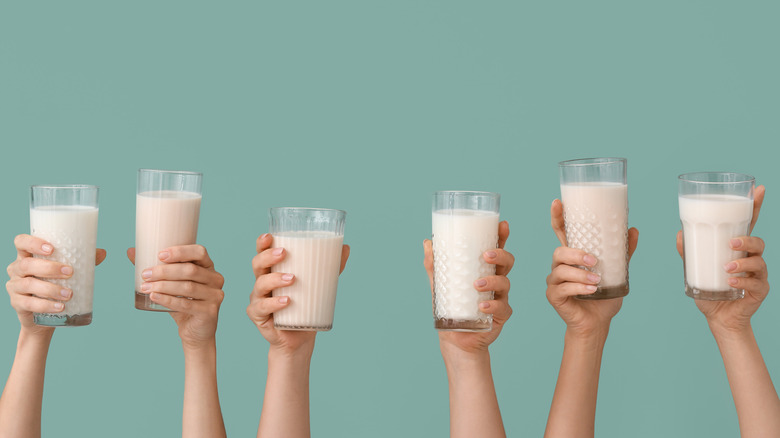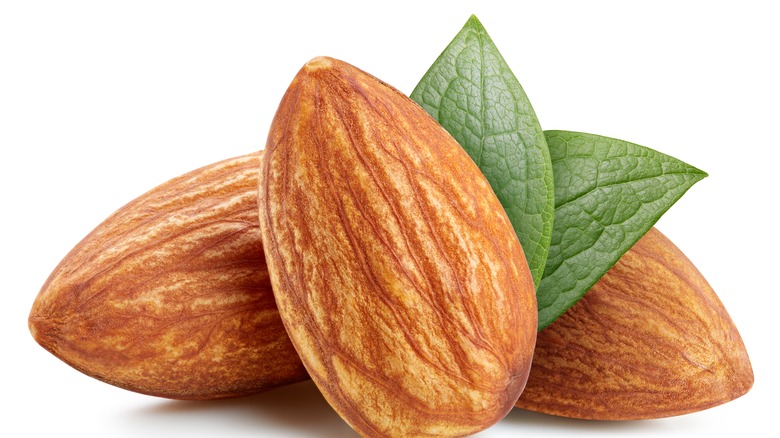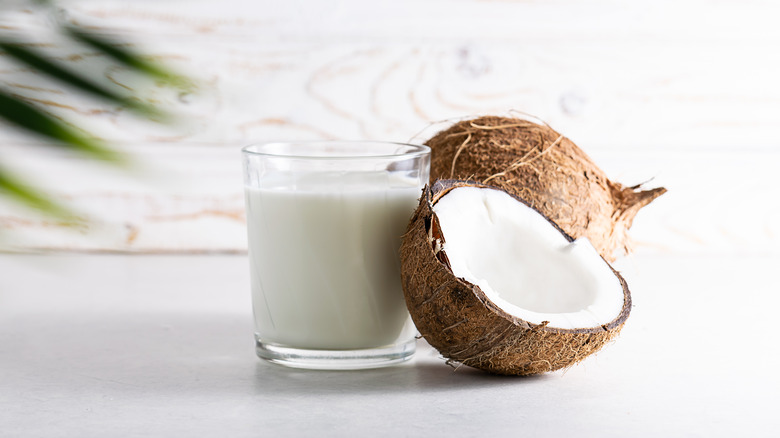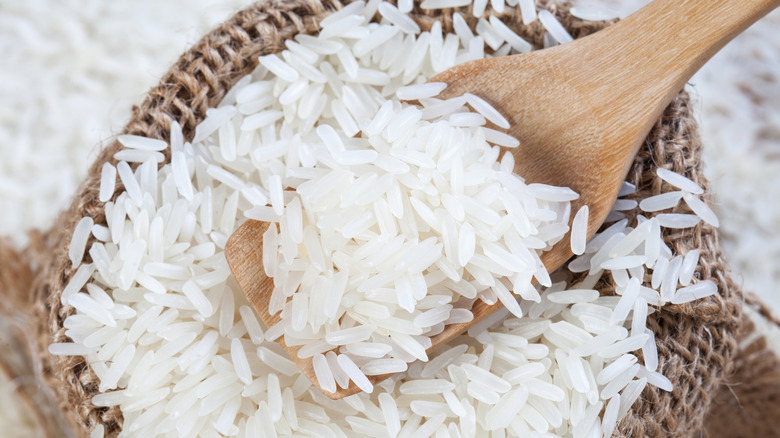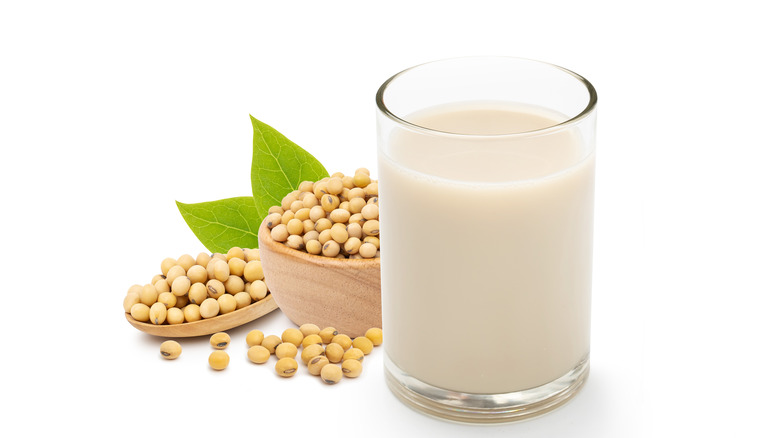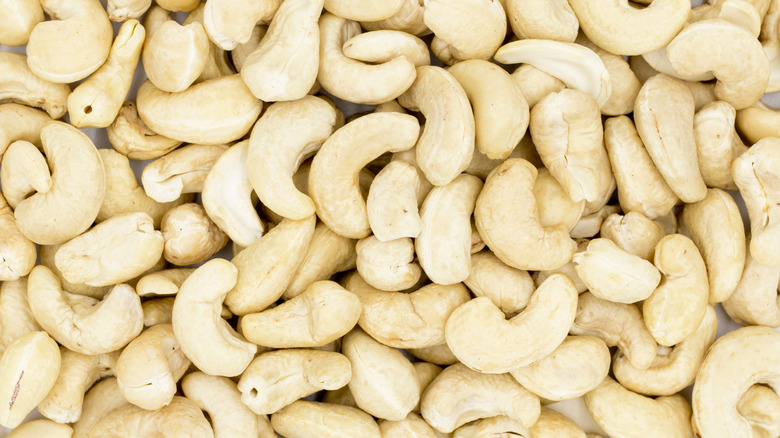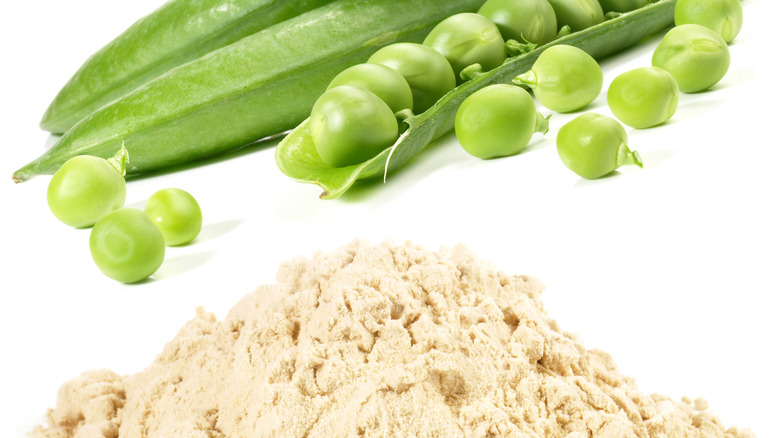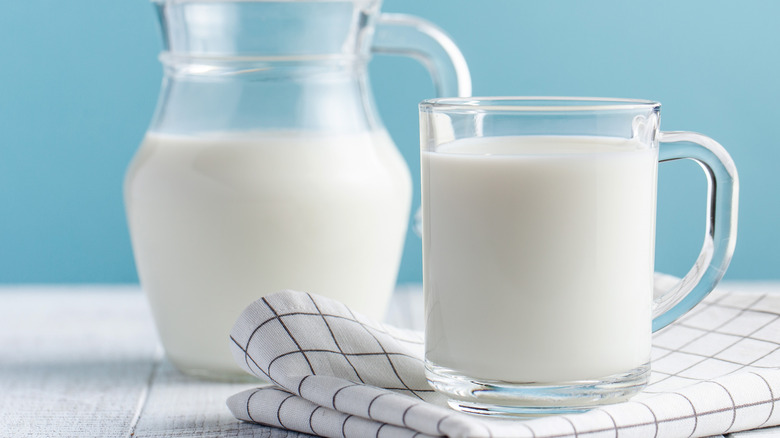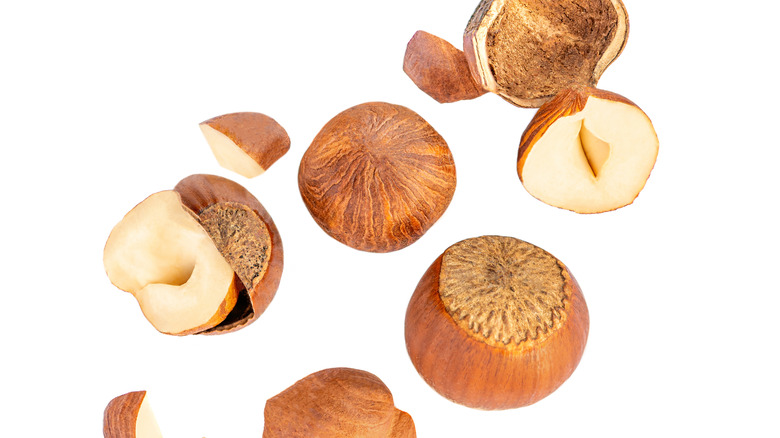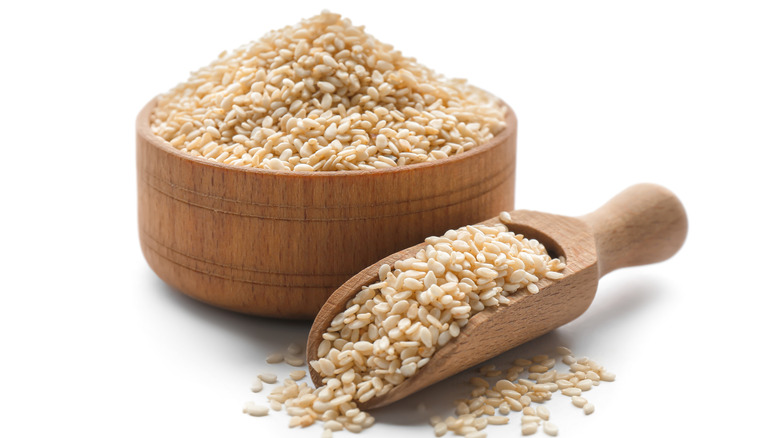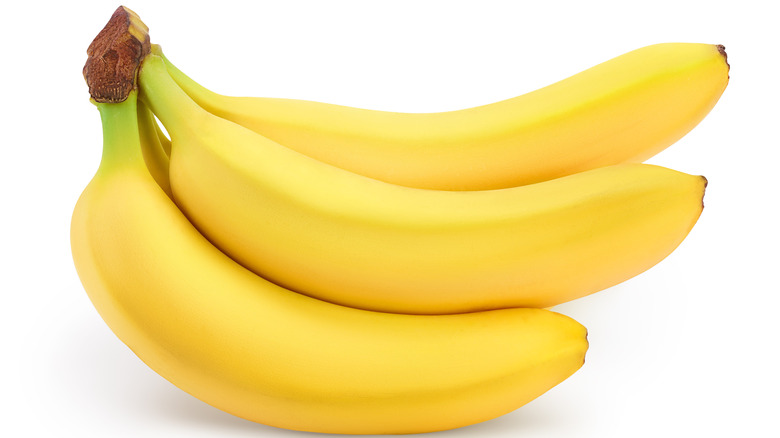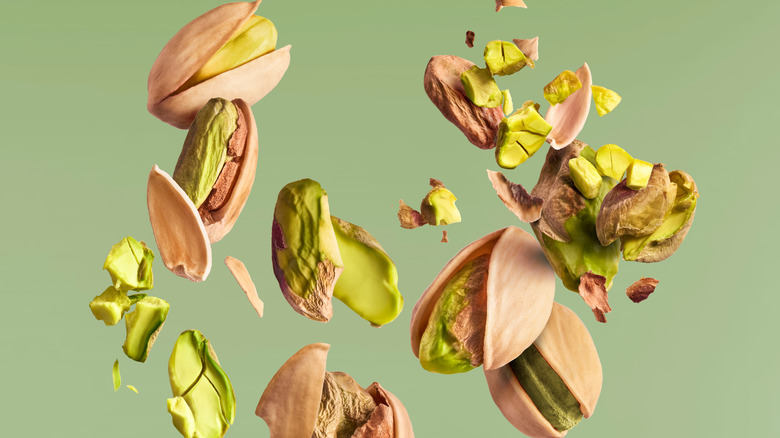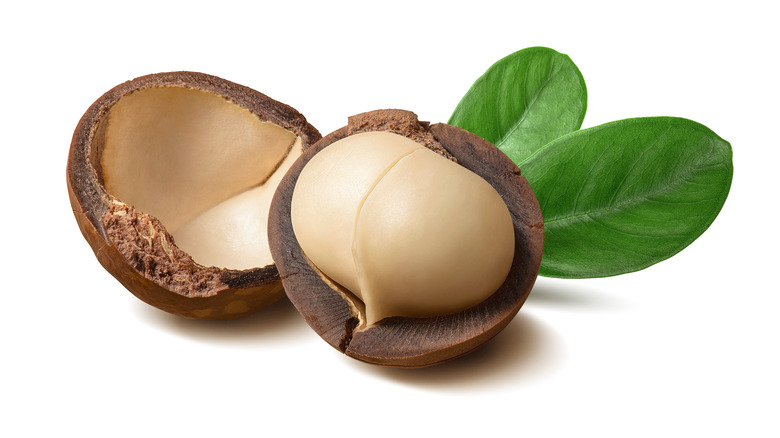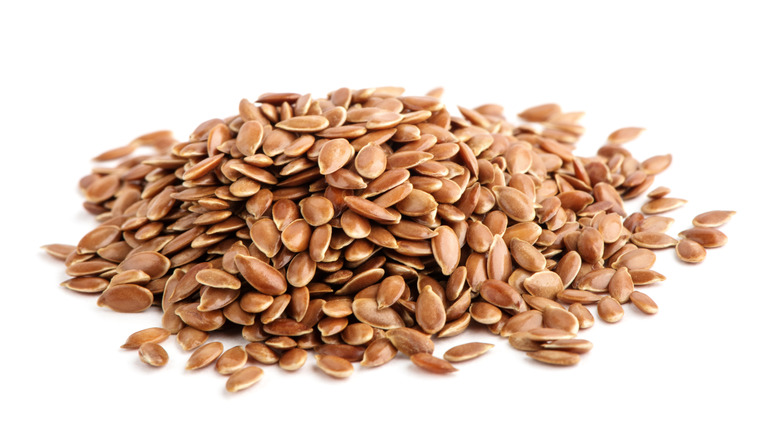Every Type Of Plant-Based Milk Explained
Many of us grew up drinking regular old cow's milk – and there are plenty of reasons why. Along with being creamy and delicious, cow's milk is considered a "nutrition powerhouse," offering a range of important health benefits (per Got Milk?). Drinking milk helps to keep bones strong, muscles functioning, and the body's fluids in balance. It can also boost immunity, aid cell growth, improve skin health, and benefit your vision. In terms of nutrition, one cup of whole cow's milk contains 149 calories, 8 grams of protein, 8 grams of fat, and 12 grams of carbs.
Despite the many reasons to drink cow's milk, the plant-based milk market is booming. According to the American Society for Nutrition, some have made the switch due to health issues such as lactose intolerance, milk allergies, or underlying diseases impacting digestion. Other people wish to avoid ingesting antibiotics, pesticides, or hormones that can be found in regular milk. Still others don't like the taste, are ethically opposed to animal products, or have concerns about dairy's environmental impact.
No matter your reasons for drinking (or not drinking) plant-based milks, you should be aware that they tend to provide fewer calories, less fat, and lower protein content than regular milk, and are often fortified with vitamins and minerals. It is also important to know that nutritional benefits vary depending on the exact product you select. Below, we explain every type of plant-based milk.
Oat milk
There's little doubt that oat milk is trending in a big way. This versatile plant-based milk can be used as a stand-alone beverage, to liven up your morning cup of joe (it can even be frothed!), and as a dairy substitute when baking, thanks to its neutral flavor (via Good Housekeeping). Love & Lemons suggests drinking chilled oat milk over ice, along with adding it to oatmeal and other breakfast or brunch recipes.
Although widely available at grocery stores, making oat milk at home is inexpensive and fairly straightforward. Healthline provides the following recipe: Blend 1 cup of oats with 3 cups of cold water for 30 seconds. Strain the mixture over cheesecloth to separate the milk from the oats. Gather the ends of the cheesecloth into a sac and squeeze out any remaining liquid. If desired, you can add salt, vanilla, dates, maple syrup, or honey before blending. Safely store in the fridge for up to 5 days.
As for nutrition, one cup of Malk brand oat milk contains 90 calories, 3 grams of protein, 1.5 grams of fat, and 12 grams of carbs — but keep in mind that homemade oat milk may vary nutritionally from commercial products. This is because the FDA allows the addition of vitamins D and A to non-dairy milks, resulting in a similar nutritional makeup as cow's milk.
Almond milk
The most popular plant-based milk in the US is almond milk, according to Medical News Today. While almonds generally offer a wide range of health benefits, these don't necessarily transfer over to almond milk. One reason for this is that commercial brands do not typically include fiber- and antioxidant-rich almond skins. Additionally, they strain and water down their products. Nevertheless, enriched almond milk is nearly as nutritious as cow's milk, with one cup providing 39.3 calories, 1.05 grams of protein, 2.52 grams of fat, and 3.43 grams of carbs.
In an Eat This, Not That! article identifying the best almond milks to buy, registered dietitian nutritionist Sammi Haber Brondo explains, "If you don't eat dairy, almond milk is a great alternative because it's fortified with vitamins and minerals. It's a good source of calcium, vitamin E, and vitamin D." Just be sure to choose products with unsweetened flavors, enriched nutrients, a short ingredient list, and no carrageenan. Recommendations include Blue Diamond Almond Breeze Unsweetened Almondmilk, Elmhurst Milked Almonds, Silk Original Almondmilk, and Califia Farms Unsweetened Almondmilk.
If you prefer to make your own, Minimalist Baker provides instructions: Blend one cup of raw almonds (soaked in cool water overnight) with 5 cups filtered water and a pinch of sea salt for 1 to 2 minutes. Strain the mixture through a thin dish cloth, squeezing out excess moisture and discarding pulp. You can also include healthy add-ins such as dates, vanilla, cocoa powder, and berries.
Coconut milk
Traditional, canned coconut milk can be used to enhance savory dishes, sweet desserts, and even tropical cocktails — but is not actually meant to be drunk straight (per WebMD). However, some companies offer drinkable coconut milk beverages that are usually watered-down coconut cream (a thicker, more concentrated version of coconut milk). Some potential health benefits of consuming coconut milk include lowered cholesterol levels and weight loss, but the product's high saturated fat content indicates that it may be best consumed in moderation.
You should keep in mind that coconut milk's nutritional content can vary significantly, according to Medical News Today. For example, one cup of raw, canned coconut milk contains 445 calories, 4.57 grams of protein, 48.21 grams of fat, and 6.35 grams of carbs. On the other hand, one cup of a sweetened coconut milk beverage contains 74 calories, 0.5 gram of protein, 4.99 grams of fat, and 7.01 grams of carbs. Don't forget to read nutrition labels for added sugar content, since many varieties of coconut milk and coconut milk beverages are sweetened.
Of course, another option is to make your own. (But don't worry, this doesn't have to involve cracking into an actual coconut!) Kitchn suggests blending 8 ounces of unsweetened shredded coconut with 4 cups of hot water, then straining through a nut bag. You can even dehydrate the remaining pulp to create coconut flour.
Rice milk
Of all the different types of milks, rice milk is the least likely to cause an allergic reaction (per Verywell Fit). It does not contain common allergens like soy, gluten, milk protein, or nuts, though rice allergies can still occur, albeit rarely. Although the nutritional content of rice milk can vary between products, one cup provides approximately 115 calories, 0.7 gram of protein, 2.4 grams of fat, and 22.4 grams of carbs. Because rice milk is high in carbohydrates, it may be a poor choice for individuals with diabetes (per Healthline). You should also be aware that unlike dairy milk, rice milk is not a good source of protein.
To avoid sugar, preservatives, and additives that may be present in store-bought brands, you may prefer to make your own. Simple Vegan Blog provides the following instructions: Blend ½ cup cooked rice (cooled) with 2 cups of water, then strain (optional). You can use brown rice for extra nutrition and sweeten with dates, if preferred. But understand that homemade rice milk is considered a poor nutritional substitute for dairy milk. You may be better off going with enriched commercial rice milk, which is typically an excellent source of calcium and vitamin D.
Soy milk
Soy milk, made from soybeans, is the plant-based milk most nutritionally similar to low-fat cow's milk, according to Everyday Health. It is usually fortified with vitamins and minerals, including calcium and vitamin D. Barbara Schmidt, RDN, states, "I call the soybean the incredible, edible bean. With all nine essential amino acids, soy milk is rich in protein and is balanced in fats and carbs." Additionally, Julieanna Hever, plant-based dietitian and author of "The Vegiterranean Diet," says, "Soy milk offers culinary diversity, creamy texture, and a healthful nutritional profile, including essential omega-3 fatty acids [if fortified] and flavonoids that exert antioxidant, anti-inflammatory, and cardioprotective properties."
If you have heard that soy milk increases your risk of breast cancer, rest assured this isn't true (per the American Cancer Society). On the other hand, there does appear to be a (welcome) connection between soy-based foods and reduced rates of heart disease. While there is some concern over high levels of phytic acid in soy, Eat This, Not That! concludes: "As of now, what we do know is that soy milk is the least processed of all dairy-alternative milks, highest in protein, low in saturated fat, and widely available to consumers." People with soy allergies should not drink soy milk, and everyone else should select unsweetened soy milk varieties (via Livestrong). One cup of unsweetened soy milk contains around 80 calories, 7 grams of protein, 4 grams of fat, and 3 grams of carbs.
Cashew milk
Cashew milk is a creamy, low-calorie plant-based milk option. While nutrition content can vary between products, many cashew milks are fortified with vitamins and minerals, including calcium and iron. Depending on which nutrients are added, cashew milk could help boost immunity, strengthen bones, prevent anemia, control cholesterol levels, and improve eye health (per WebMD). One cup of unsweetened cashew milk contains an estimated 25 calories, less than 1 gram of protein, 2 grams of fat, and 1 gram of carbohydrates. You may wish to avoid sweetened varieties.
According to Simple Vegan Blog, you can make your own cashew milk by soaking raw unsalted cashews overnight, blending them with clean water, and straining through cheesecloth or a nut bag. Healthline explains that homemade cashew milk is generally more nutritious than store-bought varieties, though it may contain less protein and calcium. On the plus side, it tends to offer more fiber and magnesium, an essential mineral that promotes better heart health, nerve function, and blood pressure control.
Pea milk
Some plant-based milk brands have introduced pea milk in recent years. Sounds weird, right? Well, you may be surprised by pea milk's creamy texture, smooth taste, and high protein content.
One popular manufacturer, Ripple Foods, offers an unsweetened original variety that provides an impressive amount of plant-based pea protein, is 100% vegan, and does not include lactose, nuts, soy, GMOs, or gluten. One cup contains 80 calories, 8 grams of protein, 4.5 grams of fat, and less than 1 gram of carbohydrates. Ripple's products are made from yellow peas which, unlike dairy cattle or almonds, have little impact on the environment. The company's website states, "We don't claim that making plant-based foods will save the world...but we think it can help. And we know it makes us happier and healthier."
Healthline states a few good reasons to try pea milk. Along with being an excellent protein source, pea milk provides important nutrients, is hypoallergenic, and is low in calories, carbs, and sugar. On the downside, some Ripple product varieties (like chocolate) are packed with sugar, along with containing omega-6 fatty acids, which most people already consume in excess. And, while Ripple's milks are fortified with vitamin D, they use plant-based vitamin D2. Unfortunately, the body does not appear to absorb this as well as animal-sourced vitamin D3. Keep in mind that Ripple isn't the only manufacturer making pea milk; you can also find pea-based milk products from Bolthouse Farms, Veggemo, and Suja (per Thrive Cuisine).
Hemp milk
Hemp milk, made from whole hemp seeds, is rich in protein, healthy fats, and minerals, according to Healthline. As a result, drinking hemp milk offers some nice health benefits, including nourishing your skin and preventing heart disease. This plant-based milk is described as having "an earthy, nutty flavor and a creamy consistency." While derived from the same type of plant as marijuana, hemp milk does not contain psychoactive qualities (per Eat This, Not That!).
One cup of unsweetened hemp milk contains 83 calories, 4.7 grams of protein, 7.3 grams of fat, and 1.3 grams of carbs. However, some store-bought brands may add sweeteners, thickeners, and salt, which can change the nutritional content. Commercial brands may also be fortified with vitamins and minerals, such as vitamins A, B12, and D, calcium, and phosphorus.
To make your own, blend ½ to 1 cup raw hemp seeds with 3 to 4 cups of water for one minute, then strain through cheesecloth (optional) for a smoother consistency. Some people don't like the taste or texture of homemade hemp milk (via Medical News Today). If you decide to pick some up at the store, Eat This, Not That! recommends Living Harvest Tempt Hempmilk Unsweetened Original. But be aware that hemp milk tends to cost more than other types of plant-based milks.
Hazelnut milk
While not as popular as other types of plant-based milks, hazelnut milk has much to offer from a nutritional perspective. Along with being naturally free of gluten, lactose, and soy, it is packed with B vitamins, vitamin E, and omega-3 fatty acids (per Men's Journal). Drinking it can boost mental health and help your body produce red blood cells, transport oxygen, and maintain healthy blood pressure levels. Hazelnut milk can even play a role in preventing anemia, heart disease, and cancer.
One Green Planet touts even more benefits of hazelnut milk. They point out that it is low in calories, with no cholesterol or saturated fat. It is also rich in folic acid, an important nutrient especially for pregnant women. Best of all, hazelnut milk is extremely versatile: It can be drunk straight, added to hot beverages or cereal, or used in cooking. To make your own, soak ¾ cup of hazelnuts in 3 ½ cups of water overnight, add ¼ teaspoon vanilla extract, blend in a high-speed blender until smooth, and strain (via A Beautiful Plate).
Sesame milk
Sesame milk has arrived fairly recently to the plant-based milk market. You may be interested to learn that it has less of an environmental impact than other types of milks, along with offering a fair amount of nutrition (per Green Matters). Although you may expect it to taste like hummus or tahini, one tester described it as sweet and creamy, with a distinct flavor closer to soy milk.
Nutramilk discusses some of the many health benefits associated with sesame seeds (and by proxy, sesame milk). Sesame seeds have been linked to better heart, bone, skin, and oral health, along with helping prevent liver damage and some types of cancer. Sesame milk also provides an excellent source of calcium, iron, zinc, and other essential vitamins and minerals.
But should you go ahead and make the switch from cow's milk to sesame milk (or to plant-based milks in general)? Nutrition consultant Keri Gans told Grateful, "As a nutrition expert, I look at this 'milk' as another option in the beverage category but not as a total cow's milk replacement unless dietary restrictions mandate."
Banana milk
What, exactly, is banana milk? Well, you probably won't be surprised to hear that this plant-based milk contains bananas and water. However, beyond these two primary ingredients, "things can get a little crazy," according to the Food Network. Some banana milk varieties include almonds or soy; others are flavored with vanilla, chocolate, or cinnamon. The bananas themselves act as a natural sweetener. Due to the range of potential ingredients, banana milk's nutritional content can vary widely.
What we know for sure is that bananas offer many health benefits. According to WebMD, bananas are full of potassium, which can help keep your heart healthy. They also offer a good dose of soluble fiber and prebiotics, which can aid digestion, along with containing vitamins A, B6, C, and magnesium — all of which help keep your body functioning properly. Finally, although a lesser known benefit, bananas offer high levels of tryptophan, which can make you feel happy and help you get a good night's sleep (per Active Beat).
Pistachio milk
If you love the taste of pistachios, you may want to give pistachio milk a try. Unlike some of the other plant-based milks whose flavors tend to fade into the background, pure pistachio milk actually tastes like pistachios, per Bon Appetit. In fact, the popular food magazine's executive editor, Sonia Chopra, had this to say about pistachio milk: "After 11 months of being extremely picky about coffee and spending most of my disposable income on beans, I am here to admit that I'm obsessed with the new pistachio brown butter Starbucks latte."
Cooking Light talked to registered dietitians about the nutritional value of pistachio milk. Similar to most other plant-based milks, pistachio milk is generally lower in calories, saturated fat, and carbohydrates than cow's milk. It is also slightly higher in protein than other plant-based milks, offering around 3 grams. But nutritional consultant Lauren Minchen points out that pistachio milk is made up of mostly water, containing only about 3% pistachios. And it's pricey: a container of Táche's pistachio milk costs around $8 a quart. Of course, you can always choose to make your own by soaking pistachios overnight, blending them with water, and straining (via Whole Foods Market).
(Be right back — off to Starbucks for that pistachio brown butter latte!)
Macadamia milk
According to Livestrong, macadamia milk has the ability to "make your morning lattes rich and decadent." It is also low in carbohydrates, high in healthy fats, and can add important nutrients to your diet, especially when fortified with vitamins and minerals. One cup of unsweetened macadamia nut milk contains 50 calories, 1 gram of protein, 5 grams of fat, and 1 gram of carbs. Note that not many brands are actually selling macadamia milk in stores — Milkadamia appears to be one of the main players.
Consuming macadamia nuts can offer health benefits, such as lowering body weight and LDL cholesterol levels (per Detoxinista). But what does it taste like? "Macadamia milk tastes exactly like the nut it came from. If you don't like the taste of macadamia nuts, you won't like this milk." Keep in mind that macadamia nuts, especially whole ones, can be more expensive than other types of nuts. But there's really no reason why you can't use macadamia nut halves or pieces to blend up your own macadamia milk at home.
Flaxseed milk
If you're allergic to nuts or soy and looking for a nutritious plant-based milk alternative, you may want to consider flaxseed milk. Made primarily from flax seeds and water, flaxseed milk has "an earthy and nutty flavor", according to The Healthy. Registered dietitian Elizabeth Gunner states, "Flax milk is a popular alternative for dairy milk because it's just as high in calcium as dairy milk [if fortified], and it's great to use in a variety of recipes." One cup of unsweetened flaxseed milk contains around 50 calories, 3 grams of protein, 3.5 grams of fat, and 4 grams of carbs. As with other types of plant-based milks, selecting unsweetened varieties will save you from consuming added sugars and calories.
An article in Well+Good points out that flaxseed milk is a good source of omega-3 fatty acids, which can benefit both your brain and your heart. Flaxseeds are also environment-friendly. "I like this as an option compared to most other vegan milks, with the exception of soy milk, which has a stronger nutritional profile," states Aja Gyimah, nutrition expert. But she adds that cow's milk contains more protein, calcium, and vitamin D.

